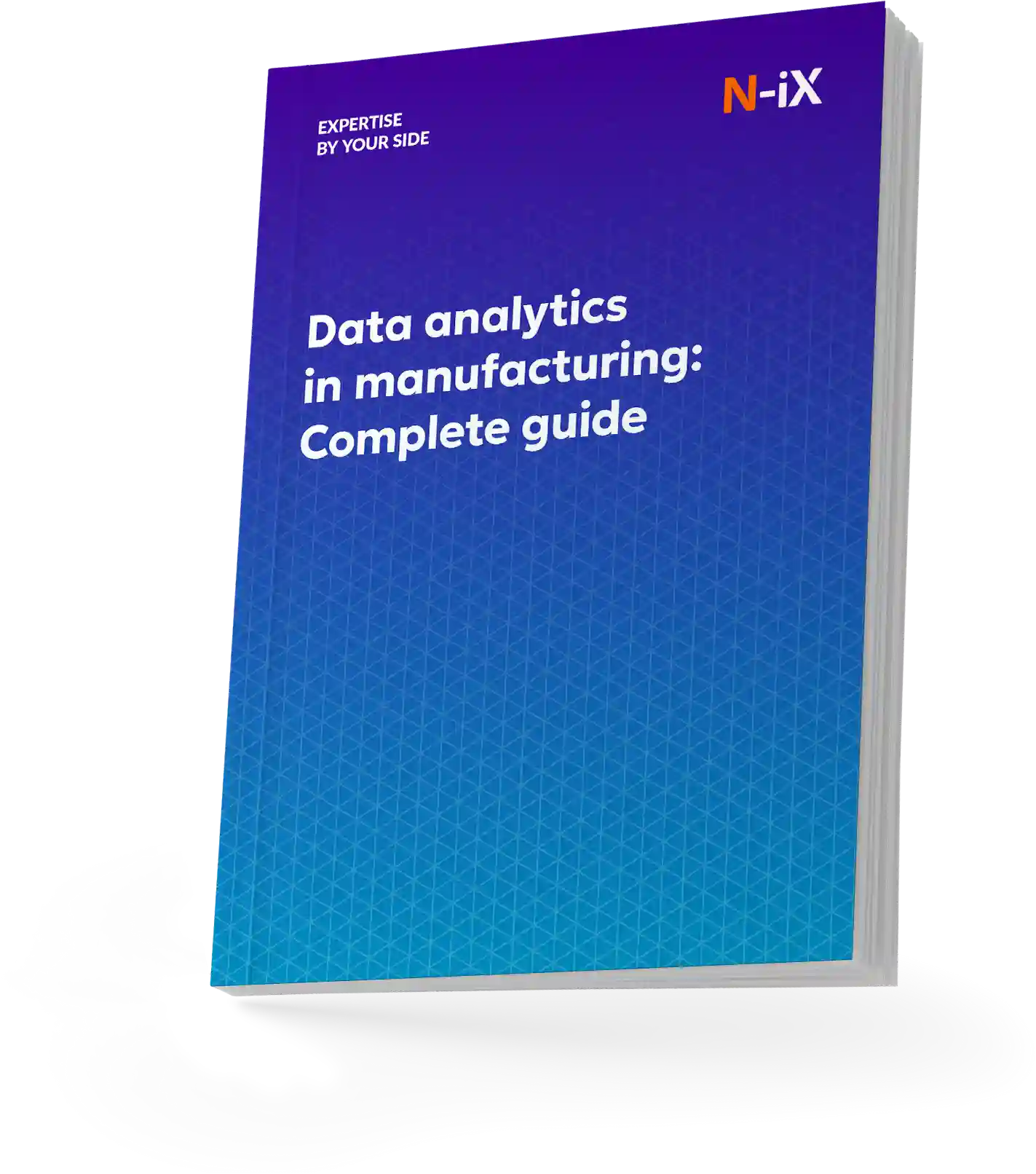Gartner names Agentic AI the top strategic technology trend for 2025, projecting that one-third of enterprise software will include it by 2028. For manufacturers, it signals a move from AI that assists people to AI agents for manufacturing that autonomously manage production and decision-making.
After strong ROI from generative AI in 2024 (78% of executives reported positive ROI), the next wave is already here. Agentic AI drives real-time optimization, reducing downtime, improving energy efficiency, and enhancing quality control. Through our AI consulting services, N-iX helps manufacturers design and deploy such autonomous systems, aligning technology investments with measurable operational gains.
This article explores the business value of Agentic AI in manufacturing, key use cases, and how early adopters are redefining factory performance with intelligent autonomy.

Understanding agentic AI in manufacturing
AI agents are autonomous systems that can perceive context, make decisions, and execute tasks without step-by-step human guidance. In manufacturing, these agents manage production schedules, predict failures, inspect quality, and coordinate supply chains while continuously learning from data streams across machines, sensors, and systems.
This isn’t a distant vision. According to IBM:
-
56% of manufacturers already deploy AI agents, with 37% running over ten applications.
-
21% apply AI to supply chain management, and 60% plan to within two years.
-
Most businesses invest in AI to reduce costs, improve operational efficiency, improve visibility, process optimization, and compensate for labor shortages.

AI agents for manufacturing: Use cases and value
Manufacturing executives are pressured to deliver faster production, cut costs, comply with sustainability standards, and address labor shortages. One of the key benefits of agentic AI in manufacturing lies in its ability to address those challenges. Here are the most impactful agentic AI use cases in manufacturing, showing how industry leaders implement this technology.
Faster production and reduced costs
Agentic AI monitors production lines, autonomously preventing delays and maximizing output efficiency. BMW uses AI-enhanced assembly robots capable of identifying bottlenecks and adjusting workflows independently. This led to a fivefold productivity increase and reduction in production downtime, accelerating innovation cycles in product design.
Explore further: AI agents in industrial IoT: Turning data into intelligent action
Predictive maintenance
Agentic AI autonomously detects anomalies in machine behavior and prevents costly equipment failures before they occur. Manufacturers use these systems to schedule maintenance proactively and extend asset life. Siemens applies AI-powered predictive maintenance with IoT sensors and ML, reducing disruptions and prolonging machine performance.
Discover where data analytics improves manufacturing processes—get the guide!


Success!

Automated quality control and defect detection
AI-powered tools continuously inspect components, catching defects and anomalies that human inspectors may miss. BMW, for instance, analyzes thousands of vehicle images per hour to detect microscopic paint inconsistencies, ensuring consistent quality and reducing rework. Another manufacturer saw a 30% drop in defect rates, with inspection time per seat falling from 1 minute to 2.2 seconds using AI.
Supply chain resilience
Agentic AI predicts demand changes and supply risks, autonomously adjusting orders and inventory levels. Siemens optimizes its complex supply chain by enabling AI agents to make independent decisions based on evolving demand signals, resulting in nearly 20% lower inventory holding costs and improved response times. Fanuc also employs autonomous robotics to optimize material handling and assembly workflows, reducing human intervention and boosting factory productivity.
Human-AI collaboration
Multi-agent systems act as intelligent assistants on the shop floor, in R&D, and across logistics. General Electric applies AI agents to monitor machinery and proactively schedule maintenance in aviation manufacturing, enhancing overall asset reliability and freeing teams to focus on strategic initiatives.
Digital twin and simulation
Agentic AI applications in manufacturing also include simulation and digital twin technology, which allow operators to run thousands of “what-if” scenarios, discovering more efficient operating parameters and optimizing processes before applying changes. For example, a pharmaceutical manufacturer optimized tablet compression and reduced product changeover time from 4 hours to 45 minutes.
Learn more: Digital twins in manufacturing: benefits, technologies and use cases
While these agentic AI use cases in manufacturing show the technology's impact, success depends on how effectively organizations integrate it into their existing operations, and that’s where experienced partners like N-iX come in.
Agentic AI challenges and how to fix them
While agentic AI creates measurable value, manufacturers face hurdles when integrating AI agents at scale. Understanding these challenges and having the right tech partner to fix them is key to turning potential into results.
Misaligned business goals
Managers and technical teams may have different ideas about what agentic AI for manufacturing should achieve, resulting in unclear KPIs. Misalignment leads to unclear KPIs and stalled adoption. Aligning teams from the start ensures that projects target measurable operational outcomes rather than abstract technical metrics.
Solution: N-iX works with stakeholders to define clear objectives and KPIs, ensuring AI initiatives deliver tangible results.
Data quality
Inaccurate, siloed, or incomplete data can cause AI agents to underperform. (Inaccurate answers in customer support interactions, while poor data pipelines can cause agents to hallucinate). Efficient AI requires robust pipelines, metadata management, and continuous data quality monitoring.
Solution: N-iX builds and manages connected data pipelines across MES, ERP, and QMS systems, ensuring AI agents operate reliably with clean and contextualized data.
Focusing on technology instead of outcomes
Stakeholders often prioritize cutting-edge AI models or features while neglecting operational pain points. This can result in high technical costs but minimal business impact. Focusing on real-world workflows and measurable metrics is essential to proving ROI.
Solution: We focus on agentic AI applications in manufacturing to address business challenges such as predictive maintenance, supply chain optimization, or throughput improvement.
Fragmented execution across teams
Disconnected teams create silos, reducing AI adoption and effectiveness. Lack of centralized oversight leads to duplicated work, orphaned models, and reduced data quality. Coordination is crucial to achieve the full value of AI initiatives.
Solution: Our team coordinates cross-functional teams, providing structured governance and end-to-end program oversight to maintain alignment, visibility, and ROI.
Insufficient infrastructure
Many manufacturers lack the scalable platforms, APIs, and orchestration layers for enterprise-grade AI agents. Without proper infrastructure, agentic AI in manufacturing cannot achieve full autonomy or operate reliably across complex workflows.
Solution: N-iX designs agent-ready architectures and scalable integration frameworks, enabling AI agents to operate reliably across multiple systems and plants.
Workflow and system integration failures
AI agents fail when they cannot navigate legacy workflows or interact with multiple systems. Poor integration leads to interruptions, costly manual intervention, and reduced trust in AI.
Solution: N-iX re-architects workflows to seamlessly embed AI, optimizing workflows and ensuring agents operate efficiently across MES, ERP, and QMS systems.
Overestimating AI capabilities
Applying AI to problems beyond its current capabilities can lead to failed projects and frustration. Overhyped expectations for agentic AI applications in manufacturing risk undermining trust.
Solution: N-iX assesses project feasibility, starting with achievable tasks and gradually scaling AI agent responsibilities while monitoring reliability and performance.
Pilot paralysis
Some AI initiatives stall in pilot mode, delaying production deployment. Without structured governance, metrics, and continuous improvement, AI agents in manufacturing may never scale effectively.
Solution: N-iX treats AI pilots as production-ready projects from day one, applying product management, SLAs, and continuous monitoring to scale AI agents successfully across operations.
You may also find it interesting to read: Why your business needs AI agent orchestration
Turning potential into results: Integration matters
The success of agentic AI in manufacturing depends on how seamlessly it connects with your existing systems, such as MES, ERP, PLC, and QMS. Manufacturers need connected data pipelines, standardized interfaces, and transparent governance to smooth this integration.
Executives should take a phased approach rather than transforming everything at once. Start with a high-impact pilot (e.g., predictive maintenance), build a solid data foundation, and then expand across plants and product lines step by step. This approach minimizes risks and accelerates ROI.
Choosing the right AI development partner
Implementing agentic AI in manufacturing is more than just adopting technology. It is also a shift that requires a partner who understands both the industrial context and AI capabilities.
At N-iX, we help manufacturers turn AI agents for manufacturing into a competitive advantage.
-
Proven expertise: 23 years in technology services, with a team of AI and data experts.
-
Industry experience: Deep knowledge of manufacturing workflows, supply chain operations, and quality standards.
-
We combine domain expertise with strong technical depth, leveraging advanced ML, computer vision, predictive analytics, and agentic AI applications in manufacturing.
-
Data-first approach: Robust pipelines connecting MES, ERP, QMS, and CAD systems to fuel continuous model learning.
-
Integration and scalability: Seamless system interoperability and AI architectures that grow across plants and categories.
Wrapping up
Agentic AI represents the next frontier of industrial intelligence where machines don’t just automate tasks, but autonomously optimize processes and adapt to change. Manufacturers that invest today will lead the next wave of productivity, sustainability, and innovation.
Partner with N-iX to explore how AI agent development services can redefine your operations. Build intelligent systems that think, decide, and act for measurable performance gains across your manufacturing ecosystem.
Have a question?
Speak to an expert




